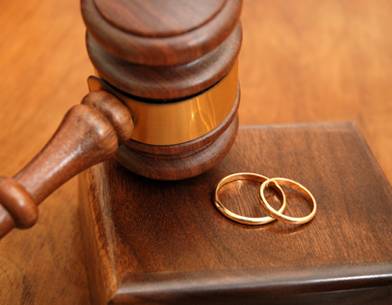
What You Need to Know About the DOMA Cases
Blog Search
This could be the year we get rid of the so-called Defense of Marriage Act (DOMA) for good, and if you are wondering how we got here and what it all means, then this post is for you.
Glossary
DOMA: The so-called Defense of Marriage Act. Read more about what DOMA is and why it’s bad here.
BLAG: The Bipartisan Legal Advisory Group, a committee of the House of Representatives that intervened in the lawsuits challenging Section 3 of DOMA to defend that law after the Obama Administration announced it would stop defending DOMA in court. While it is bipartisan in name, decisions are controlled by the Republican leadership of the House of Representatives.
OPM: Office of Personnel Management, part of the executive branch of the federal government that is responsible for, among other things, managing compensation for federal employees.
DOJ: Department of Justice, lawyers for the federal government. This department also houses the Solicitor General’s office, which in addition to other things, handles matters of federal law at the Supreme Court.
GLAD: Gay &Lesbian Advocates & Defenders.
ACLU: American Civil Liberties Union.
First, a description of the federal court system in a nutshell. There are three levels of federal courts. Federal cases begin at the federal district court level. The losing party at the district court generally has a right of appeal up to the federal courts of appeals—there are 13 circuit courts of appeals. Although the U.S. Supreme Court is the highest court in the land, there generally is no right to have the U.S. Supreme Court hear an appeal of a lower court decision. The Court must be asked to hear it, and they have discretion about whether they're going to grant review or not. If they don’t, then the decision at the circuit court level is the final decision. The U.S. Supreme Court hears less than 1 percent of the cases that are presented to it for review each year.
Right now there are four different cases in which lower courts all held Section 3 of DOMA to be unconstitutional that one or more parties are asking the Supreme Court to hear, so that there can be a final ruling on the constitutionality of Section 3 of DOMA. Here are the first two cases.
Gill v. Office of Personnel Management
This is a case brought by Gay & Lesbian Advocates & Defenders representing several same-sex couples and individuals across Massachusetts whose marriages were not recognized by the federal government. That case has been combined with another case that was filed by the Attorney General of the Commonwealth of Massachusetts, also challenging Section 3 of DOMA. After the Obama Administration stopped defending DOMA in court, the Bipartisan Legal Advisory Group (BLAG), which is a committee of the House of Representatives controlled by the Republican leadership of the House, intervened in the lawsuit to defend DOMA.
Both the federal District Court for Massachusetts and the First Circuit Court of Appeals (which hears appeals from that court) held Section 3 of DOMA unconstitutional in this case. After the circuit court ruling, BLAG asked the Supreme Court to hear the case. In addition, the Solicitor General's Office, which is a division of the Department of Justice, also asked the Supreme Court to hear the case. And now the Commonwealth of Massachusetts has joined in asking the Supreme Court to hear the case as well.
Golinski v. Office of Personnel Management
This is Lambda Legal’s case representing a federal court employee fighting to maintain health benefits for her spouse, which she was initially denied until Lambda Legal won a ruling in her favor. The Northern District Court of California ruled that Section 3 of DOMA is unconstitutional. The Solicitor General's Office, which is a division within the Department of Justice, has asked the Supreme Court to hear our Golinski case and skip the Ninth Circuit Court of Appeals, because they believe it's a particularly good case for the Supreme Court to consider. Unlike the Gill case (and the Windsor case, discussed below), in Golinski, the district court judge looked at all of the evidence about whether or not courts should look suspiciously at laws that discriminate based on sexual orientation—in other words, whether the courts should use a level of review known as “heightened scrutiny.” Discriminatory laws are almost always struck down under heightened scrutiny review because the government defending the law must at least prove that the law substantially furthers an important and legitimate government purpose. So the central question in all of these cases challenging Section 3 of DOMA is “What government purpose is served by refusing to respect the marriages of same-sex couples?” And we believe the answer is that no legitimate government interest is served by harming our families.
The district court in the Golinski case concluded that, because lesbians and gay men have suffered a history of discrimination in this country, and because sexual orientation is not a characteristic that is related to whether or not people can contribute to society, courts should put the burden on the government to show that DOMA’s discriminatory treatment of same-sex couples is necessary to substantially further an important government goal. The district court concluded that there was not even any legitimate government purpose served by the law and therefore held Section 3 of DOMA unconstitutional.
This is a case brought by the ACLU representing a widow who had to pay more than $300,000 in federal estate taxes that she would not have had to pay had her marriage to another woman been treated the same way as the federal government deals with a marriage between a man and a woman. The federal District Court for the Southern District of New York held Section 3 of DOMA unconstitutional without reaching whether or not courts should apply heightened scrutiny to laws that discriminate based on sexual orientation. The ACLU has asked the Supreme Court to hear that case without waiting for a decision from the Second Circuit, to which it has been appealed. The case was argued to the Second Circuit on September 27. The Solicitor General’s office has asked the Supreme Court to hear this case if the Court does not take the Gill, Golinski, or Pedersen cases.
Pedersen v. Office of Personnel Management
This is another case brought by Gay & Lesbian Advocates & Defenders representing a number of couples and individuals from Connecticut, Vermont, and New Hampshire whose marriages were not recognized by the federal government. The federal District Court for Connecticut ruled that Section 3 of DOMA is unconstitutional whether courts apply heightened scrutiny of laws that discriminate based on sexual orientation or not. The Solicitor General’s office has asked the U.S. Supreme Court to hear this case as well if it does not take the Gill or Golinski cases.
It is also important to note that, if the U.S. Supreme Court takes any one of these cases, we will have the Department of Justice arguing on our side rather than against us. Having the Executive Branch stand up for LGBT equality represents a milestone in our fight for equal rights and could make quite a difference in how the Supreme Court views the cases. There is overwhelming popular and legal support for getting rid of this law, and we won’t give up until DOMA is gone for good.
Stand up to defeat DOMA. Sign our pledge now!
Earlier: What Is DOMA and Why Is It Bad
Top 10 Things You Should Know About DOMA and the U.S. Supreme Court




